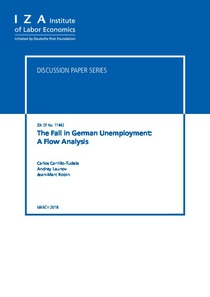The fall in German unemployment: a flow analysis
"In this paper we investigate the recent fall in unemployment, and the rise in part-time work, labour market participation, inequality and welfare in Germany. Unemployment fell because the Hartz IV reform induced a large fraction of the long-term unemployed to deregister as jobseekers and appea...
| Main Authors: | , , |
|---|---|
| Institution: | ETUI-European Trade Union Institute |
| Format: | TEXT |
| Language: | English |
| Published: |
Bonn
2018
IZA |
| Subjects: | |
| Online Access: | https://www.labourline.org/KENTIKA-19399946124911171289-The-fall-in-German-unemploymen.htm |
| Summary: | "In this paper we investigate the recent fall in unemployment, and the rise in part-time work, labour market participation, inequality and welfare in Germany. Unemployment fell because the Hartz IV reform induced a large fraction of the long-term unemployed to deregister as jobseekers and appear as non-participants. Yet, labour force participation increased because many unregistered-unemployed workers ended up accepting low-paid part-time work that was offered in quantity in absence of a universal minimum wage. A large part of the rise in part-time work was also due to the tax benefits Hartz II introduced to take up a mini-job as secondary employment. This has provided an easy way to top-up labour income staggering under the pressure of wage moderation. The rise in part-time work led to an increase in inequality at the lower end of income distribution. Overall we find that Germany increased welfare as unemployment fell." |
|---|---|
| Physical Description: | 48 p. Digital |

